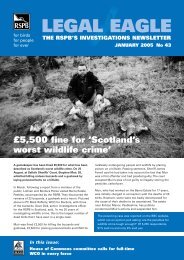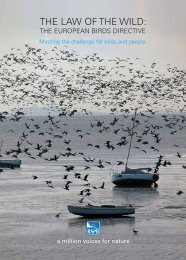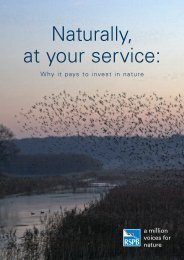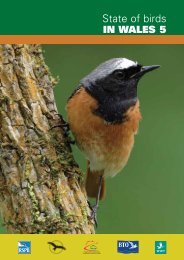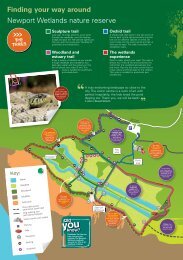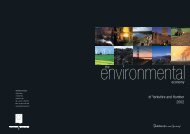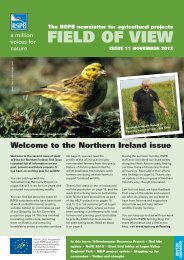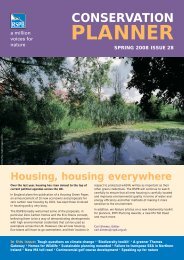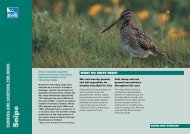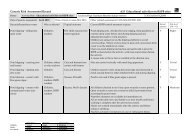State of Nature report - RSPB
State of Nature report - RSPB
State of Nature report - RSPB
Create successful ePaper yourself
Turn your PDF publications into a flip-book with our unique Google optimized e-Paper software.
INTRODUCTION<br />
Introduction<br />
This, the inaugural <strong>State</strong> <strong>of</strong> <strong>Nature</strong><br />
<strong>report</strong>, is the first <strong>of</strong> its kind<br />
to document the status and<br />
population trends <strong>of</strong> animals and<br />
plants in the United Kingdom and<br />
its Overseas Territories.<br />
The wildlife here is special and diverse;<br />
many rare and threatened habitats<br />
support endemic species found<br />
nowhere else on Earth. Our shores<br />
are home to huge, internationally<br />
important seabird colonies and<br />
beautiful species <strong>of</strong> mosses and<br />
lichens that clothe the surface <strong>of</strong><br />
trees and rocks. The diverse<br />
landscape is made up <strong>of</strong> a patchwork<br />
<strong>of</strong> different habitats, from the<br />
magnificent Caledonian pine forests<br />
<strong>of</strong> Scotland to the purple-hued<br />
heathlands <strong>of</strong> Dorset, each one<br />
special and irreplaceable.<br />
Wherever you are in the UK, an exciting<br />
encounter with nature is never far away;<br />
be it the sight <strong>of</strong> an azure hawker<br />
dragonfly skimming over a Scottish<br />
bog pool, a pod <strong>of</strong> common bottlenose<br />
dolphins frolicking in the waters <strong>of</strong><br />
Cardigan Bay, or the world’s fastest bird,<br />
the peregrine falcon, stooping to catch<br />
prey above the Tate Modern in London.<br />
There has always been a special<br />
connection between people and nature<br />
and it continues to enrich our lives and<br />
inspire each new generation. However,<br />
our wonder and joy at this abundance<br />
<strong>of</strong> nature is tempered by concern about<br />
the changes it is experiencing and the<br />
threats it faces.<br />
Our countryside has lost millions <strong>of</strong><br />
the skylarks that herald the spring<br />
dawn, Duke <strong>of</strong> Burgundy butterflies<br />
have disappeared from our woodland<br />
glades, and even hedgehogs struggle<br />
in our gardens. But there is good news<br />
too; otters can be seen in our rivers<br />
once again, red kites and sea eagles<br />
soar where they have been absent for<br />
centuries and new species are pushing<br />
north from continental Europe.<br />
Our aim<br />
So what is the overall state <strong>of</strong> nature in<br />
the UK? Here, we attempt to summarise<br />
the best available information in order<br />
to come to a conclusion. We weigh<br />
up the pluses and minuses to give an<br />
objective overview <strong>of</strong> how wildlife is<br />
doing in the UK. We have, however,<br />
found ourselves constrained by the<br />
availability <strong>of</strong> reliable data and as a<br />
result we must accept the limitations<br />
<strong>of</strong> the conclusions we draw from this<br />
overview. We hope that this is a step<br />
in the right direction, towards a more<br />
complete understanding <strong>of</strong> the state<br />
<strong>of</strong> our nature.<br />
The aim <strong>of</strong> this <strong>report</strong> is to produce<br />
an authoritative assessment <strong>of</strong> the<br />
changing fortunes <strong>of</strong> nature in the UK,<br />
by focusing on the building blocks <strong>of</strong><br />
our ecosystems – species. We have<br />
looked across the UK’s major habitat<br />
types and taxonomic groups, and<br />
attempted to reflect the situation<br />
across the UK’s four constituent<br />
countries. We have also tried to shine<br />
a light upon the immense wealth <strong>of</strong><br />
globally important wildlife found in the<br />
UKOTs, scattered across the globe from<br />
the Antarctic to the Caribbean.<br />
Working together<br />
Produced by an exciting new<br />
coalition <strong>of</strong> conservation and research<br />
organisations, this <strong>report</strong> draws on<br />
the very latest information available.<br />
A wide range <strong>of</strong> people and partner<br />
organisations have contributed, each<br />
bringing with them special expertise on<br />
particular groups <strong>of</strong> animals and plants.<br />
Never before has information been<br />
brought together in this way to provide<br />
a powerful and unique insight into the<br />
state <strong>of</strong> nature, and how it is changing.<br />
Our synthesis is both revealing and<br />
concerning at the same time.<br />
There is much to be proud <strong>of</strong> in<br />
terms <strong>of</strong> conservation success stories.<br />
We have a fantastic range <strong>of</strong> volunteer<br />
and pr<strong>of</strong>essional expertise covering an<br />
array <strong>of</strong> species, and some <strong>of</strong> the most<br />
impressive citizen science projects<br />
in the world producing high-quality<br />
data to inform conservation. We have<br />
Large scabious bee<br />
Steven Falk (Buglife)<br />
Building on other <strong>report</strong>s<br />
This <strong>report</strong> does not stand in isolation,<br />
but on the shoulders <strong>of</strong> many others<br />
that have <strong>report</strong>ed on particular<br />
elements <strong>of</strong> our natural heritage.<br />
There are a number <strong>of</strong> “<strong>State</strong> <strong>of</strong>...”<br />
<strong>report</strong>s, which in recent years have<br />
focused on trends in the UK’s nature:<br />
The state <strong>of</strong> Britain’s larger moths<br />
(2013) <strong>report</strong>ed that the total number<br />
<strong>of</strong> larger moths had fallen by 28%<br />
between 1968 and 2007, and twothirds<br />
<strong>of</strong> the 337 species monitored<br />
had declined, 37% by over half.<br />
8 STATE OF NATURE 2013




